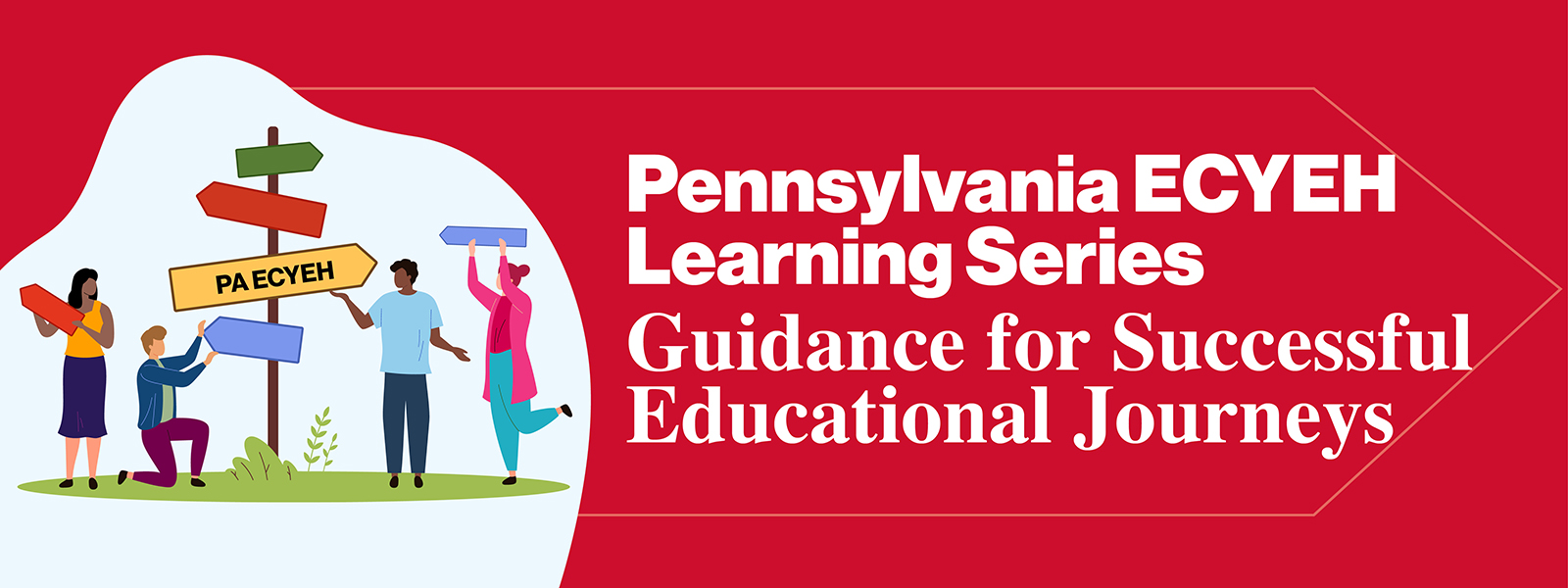
The 2025-2026 Pennsylvania ECYEH Learning Series: Guidance for Successful Educational Journeys offers a comprehensive professional development opportunity for homeless liaisons and educators committed to supporting students experiencing homelessness. This series provides critical skills, strategies, and resources to enhance the educational experience for these students and equip educators with the tools to navigate challenges effectively. Through a blend of interactive webinars, real-world case studies, and expert insights, this series will deepen your understanding and enhance your efforts to ensure positive educational outcomes.
There is no fee to attend. Act 48 credits are available.
If this is your first time registering with us, you’ll be prompted to create a free account in our registration system. Once your account is set up, simply click the link to return to the previous page and complete your event registration. Next time, your information will be saved for faster registration. Thanks!
Disclaimer: Learning series sessions are created by individual providers. The opinions presented herein do not necessarily represent the official stance or policies of the Pennsylvania Department of Education (PDE), and no official endorsement by the PDE should be inferred.
Safe Haven: Creating Spaces that Destigmatize the Mental Health Experience for Students Experiencing Homelessness and Foster Care
March 11, 2026, 10:00 AM – 11:00 AM
This session will highlight the importance of how youth-serving professionals and educators can create safer, more supportive environments for open mental health conversations with students experiencing homelessness and/or foster care. Participants will be introduced to the book and resource, “Ab(solutely) Normal”, co-authored by Rocky. Through powerful prose, verse, and visuals, the characters in this anthology challenge stigma and stereotypes—reminding us that experiencing emotional challenges does not define a person. Each story is followed by a personal note from the author and a collection of relevant tools and supports.

Presenter: Rocky Callen, Author, Speaker, Writing Consultant
Rocky Callen, the daughter of an Ecuadorian immigrant, has long lived a life of service ever since she was a 13-year-old advocating for the undocumented immigrants in her community. She interned at NASA at the age of 12, started lobbying Congress at 13, and wrote and produced student radio stories for NPR at 14. She was a behavioral therapist for over ten years. She received an MFA from Vermont College of Fine Arts and lives outside of Washington, D.C., with her husband, daughter, and baby boy. Rocky founded the Bleed Ink Foundation, a creative hub and resource center for writers, and the HoldOn2Hope Project, which unites creatives in suicide prevention and mental health awareness.
Special Session – Hosted by Region 2 ECYEH Program Office: How to Provide McKinney-Vento Training
April 28, 2026, 11:00 AM – 12:00 PM
This session will provide strategies and techniques for providing McKinney-Vento training and will help liaisons feel confident in communicating key information to school staff and community partners. For new and seasoned liaisons, building-level liaisons, and any student support staff.
Sign up for Act 48 credits/training hours on Frontline Education.
About the Presenters: Pennsylvania’s Education for Children and Youth Experiencing Homelessness (ECYEH) Program in Region 2 serves Berks, Chester, Dauphin, Lancaster, Lebanon, and Schuylkill counties and is administered by the Berks County Intermediate Unit.
Recorded 2025-2026 Learning Series Webinars
Educator Essentials: Screening and Responding to Youth Human Trafficking with CSC’s New Toolkit
Zozan Küçükaydın, Anti-Human Trafficking Services Coordinator, PCAR
[Recorded September 2025] This recorded webinar equips educators and school-based professionals with the knowledge and tools to recognize and respond to youth at risk of human trafficking. Participants will explore the Center for Schools and Communities’ Youth Human Trafficking Screening Toolkit, a trauma-informed resource designed for school-based mental health professionals, nurses, McKinney-Vento liaisons, social workers, and counselors. Learn how to identify red flags, assess risk factors, and implement school-based response protocols that prioritize student safety and well-being—empowering your team to move from awareness to action in supporting potential survivors.
Communicating with Communicators: Learn How to Reach More People More Often to Raise Awareness and Understanding of Your Students and Your Work
Karen Black, Senior Director of Communications, Charles R. Drew Charter School
[Recorded October 2025] It can be challenging to get your message noticed among the many communications a district manages. This recorded webinar helps McKinney-Vento homeless liaisons, foster care points of contact, and advocates strengthen collaboration with communications professionals to amplify their outreach during ECYEH Awareness Week and beyond. Participants will learn how to craft clear, consistent messages; write effective copy; take impactful photos; build a content calendar; and use outcomes data to demonstrate results—all while building relationships that help your stories and students be seen and heard.
Meet the ERA: Navigating the New ECYEH Reporting App with Confidence
Sheila Bell, M.A., Program Director, and Jim Ross, Senior Evaluation Coordinator
Allegheny Intermediate Unit (AIU); Evaluation, Grants, and Data Department
[Recorded October 2025] Join us on a tour of the new ECYEH Reporting App (ERA)—an upgraded version of the former ECYEH dashboard—designed to streamline reporting and tracking of children and youth experiencing homelessness. Walk through the system’s core features—including log in, data entry, event/record updates, and reporting tools—while highlighting how ERA improves data accuracy and simplifies compliance. Whether you’re a liaison, data entry staff, or program administrator, you’ll leave with practical knowledge and tips to confidently navigate ERA and leverage its functionality for greater program impact.
Understanding the Impact: A Data Walk Through ECYEH Program Trends and Insights
Sheila Bell, M.A., Program Director, and Jim Ross, Senior Evaluation Coordinator
Allegheny Intermediate Unit (AIU); Evaluation, Grants, and Data Department
[Recorded November 2025.] Explore data visualizations from the newly released 2023–24 ECYEH Evaluation Report, including identification trends, access, barriers, and outcomes. In honor of ECYEH Awareness Week (November 17-21) we’ll identify patterns, implications and engage in reflective discussion about how data can inform practice and policy.
Supporting Youth at the Intersection of Homelessness, Foster Care, and Juvenile Justice: Leveraging Federal Education Programs
Presenters: Obioma Okogbue, Co-Director/Co-TA Lead, NDTAC; Kristine Chan, Research Lead, NDTAC; Karen Rice, Senior Manager, Education Initiatives, SchoolHouse Connection; and Matthew Butensky, Youth Development Project Manager, Center for Schools and Communities
[Recorded November 2025] This session offers Pennsylvania LEA staff an overview of the overlapping challenges faced by youth experiencing homelessness, involvement in child welfare, or juvenile justice systems. Featuring experts from NDTAC, SchoolHouse Connection, and Center for Schools and Communities, the webinar highlights key federal programs, essential resources, and practical strategies to strengthen cross-program collaboration. Participants will explore promising practices and actionable approaches to support students who are neglected, delinquent, at-risk, homeless, or in foster care.
Purposeful Healing: Addressing and Preventing Vicarious Trauma
Rajni Shankar-Brown, Ph.D., MBA, M-MA, M.A., Professor, Stetson University
[Recorded December 2025.] Educators and youth service professionals often experience secondary trauma, particularly when working to support students and families experiencing trauma. Discover strategies for recognizing and preventing vicarious trauma and prioritizing well-being.
Poverty, Homelessness, and Endurance: Recognizing and Avoiding Burnout
Rajni Shankar-Brown, Ph.D., MBA, M-MA, M.A., Professor, Stetson University
[Recorded January 2026.] Address the unique challenges of working with low-income students and families, including students experiencing homelessness. Learn how to recognize signs of burnout and explore methods to build personal and professional endurance to support sustained and equitable engagement with diverse students, families, and communities.
Refuel: Addressing and Preventing Compassion Fatigue
Rajni Shankar-Brown, Ph.D., MBA, M-MA, M.A., Professor, Stetson University
[Recorded February 2026.] Dive into the causes of compassion fatigue, a common challenge for those working in youth services. Gain practical tips for self-care, boundary setting, and finding support networks to help prevent burnout and maintain compassion in their work.
